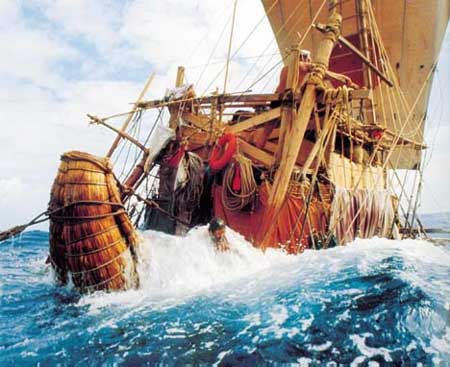Norwegian explorer Thor Heyerdahl, who made history when he sailed from Peru to Polynesia on a raft in 1947, has died at the age of 87.
The adventurer developed an unorthodox view of the progress of human settlement after the Second World War and set out to show that his theories were feasible. Convinced that the Pacific was settled by Polynesians sailing from east to west rather than in the opposite direction, in 1947 he constructed a balsa wood vessel called the Kon Tiki and set off to replicate the 4,000-mile journey.
Eschewing any advantage which would not have been available to the historical voyagers, he and the crew lived off algae and flying fish which accidentally beached themselves on the boat. Drinking water was obtained by wringing out their clothes to harvest the morning dew and by collecting rain water.
He went on to undertake two journeys in papyrus dhows Ra I and Ra II – the second of which was successful – in order to show that Egyptians could have colonised the Americas, and also sailed a reed catamaran from Tigris to the Horn of Africa. Perhaps his most scientifically recognised expeditions were those to Easter Island in the 1950s which attempted to unravel the mystery of the famous giant statues. And his 1961 tome The Archeology Of Easter Island is considered by many to be his finest achievement.
While his alternative theories and high-profile adventures earned him both the plaudits and scepticism of professional anthropologists and archaeologists, Thor’s leaps of imagination opened up new avenues of thought over the spread of cultures around the world.
Diagnosed with a brain tumour, the explorer had begun to refuse medication and sustenance this month and prepared himself for death. He passed away surrounded by his family and is survived by his third wife Jacqueline and four of his five children.
 Photo: © Alphapress.com
Photo: © Alphapress.com
 Photo: © Alphapress.com
Photo: © Alphapress.com







